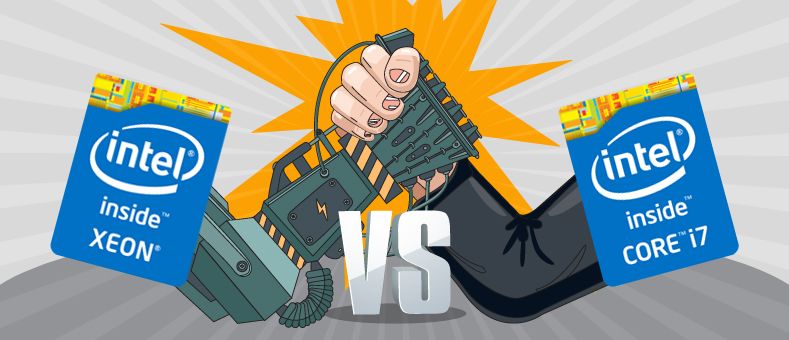Intel Xeon vs i7: Cómo decidir
- Category: Hardware
- Author: Admin
- Publisher:
Psychz Networks
- December 31,2015

“Mission-critical.” “Industry Leading.” “A new class of computing.”
Can you tell which phrases describe Intel’s Xeon processors and its Core i7 processors? We can – but only because we’re the ones who pulled them directly from the company’s promotional materials.
The marketing speak really flows from Intel when describing its different families of processors, but the catchy, impressive phrases don’t really help an intelligent user choose which processor to use in a new PC.
We’re happy to bust through the happy-speak, to look at the two CPUs and help you make a decision.
Advantages of Xeon Processors
- More cores: The latest iteration of Xeon CPUs, the E5 v3, has as many as 18 cores (processing units), making it particularly efficient for high-end design work, database processing, virtual servers etc. By comparison, i7 CPUs usually have just four cores, although the Core i7 Extreme processor can have as many as eight. Additionally, only the Xeons are capable of multi-CPU operation thus making them suitable for Dual CPU dedicated server.
- L3 cache: Xeon processors are sometimes said to be faster than most competitors; a major reason could be the 15-30MB (different models vary, of course) of L3 cache on board which can greatly speed processing time when simultaneously running a large number of complicated or demanding processes. Generally speaking, Core i7 processors have about half the amount of L3 cache available compared to Xeons.
- ECC RAM Support: Error-correcting code memory is important when data is extremely sensitive (such as in financial or research applications) because it is able to detect and fix the common causes of corrupted data and system crashes before they become issues. This means more stable and reliable performance. Xeon processors support ECC RAM, while i7 CPUs don’t.
- Choice: There are many more CPU choices available for Xeon processors (dozens of E5 models based on Haswell, Broadwell and Skylake architecture) than for i7 CPUs (12 models of the latest iteration, based on Haswell-DT architecture), so there’s a much wider range of choices in memory, frequency, cache, and other specs with Xeons.
Advantages of Core i7 Processors
- Overclocking: i7 CPUs are designed for overclocking (that is, getting your processor to work much faster than it is supposed to), a technique often desired by gamers and those using advanced video editing and imaging applications. Xeons are not meant to be multiplier overclocked; it’s possible to base clock overclock them, but you won’t gain much performance and the system’s stability may suffer.
- On-board graphics: There are integrated graphics capabilities built into all i7s, while Xeons require a discrete video card. Of course, most serious users of any sort will want a separate GPU no matter what processor they have, but if a computer is simply being used for casual applications, on-board graphics could be a plus.
- Price: Core i7 processors are somewhat less expensive than their Xeon counterparts, meaning that if you put other considerations aside you can get more speed for the money with an i7 CPU.
Conclusion
You’ll sometimes hear that Xeons are built for reliability while i7s are built for speed. However, most tests show there’s not a big difference between the two processors in either category unless you equate “speed” with overclocking capabilities. An i7 will usually cost a bit less and is fine for gaming and lower-end applications, but a Xeon is better able to handle higher-end or demanding tasks and this is one of the main reasons we only use Xeon processors for our dedicated server packages.